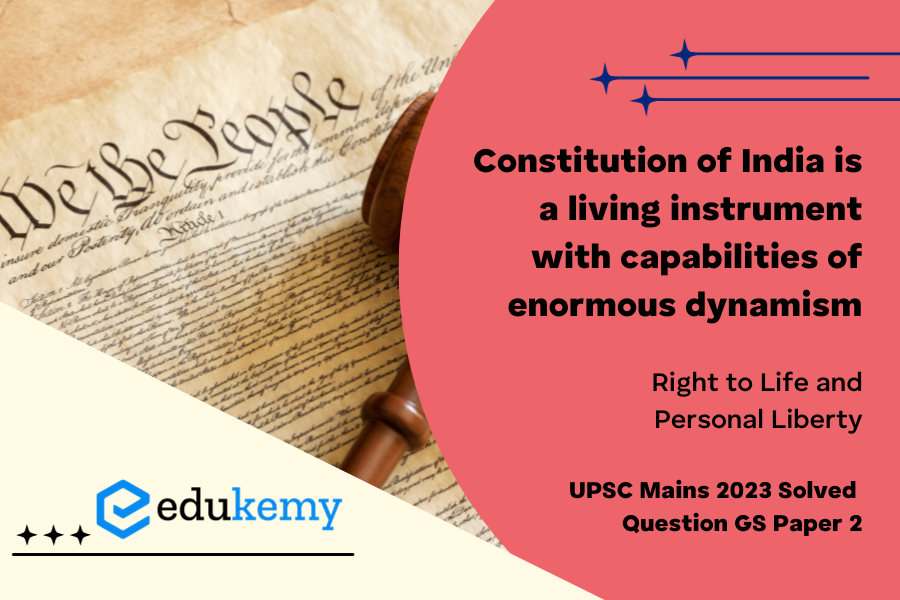UPSC Mains General Studies Paper – 1 Mains 2023
UPSC Mains Civil Services IAS Exam Question Paper – 2023
Contents
Introduction
The Constitution of India embodies a dynamic essence, evolving with societal advancements. Its provisions, notably Article 21, protect the right to life and personal liberty, continually broadening its scope to encompass environmental protection, privacy, and reproductive autonomy. This evolution reflects a forward-looking framework fostering societal progress and individual empowerment.
A quote by Dr. B. R. Ambedkar says that “ constitution is not mere a lawyer’s document , its vehicle of life , its spirit is always the spirit of age. ”It signifies the constitution of India to be a living document .
Body
Dynamic nature of the Indian Constitution
- Article 368 of the constitution deals with the powers of the parliament to amend the constitution and its procedure .However , parliament cannot amend those provisions which form the basic structure of the constitution – SC – Kesavananda Bharati case (1973).
- The Indian constitution is open to interpretations by the supreme court and amendment by the parliament .Whereas , countries like Sri Lanka and Nepal have changed the constitution multiple times instead of amending it .
- expanding horizons of right to life and personal liberty -article 21 is the most progressive provision of our constitution which has changed its horizons with passage of time – SC in Maneka Gandhi case – not merely animal existence or survival but it includes in its ambit all those aspects of life which makes man’s life meaningful , complete , worth living.
- right to privacy – Putt swamy case- the court stated that right to privacy is an inherent and integral part of part iii of the constitution.
- Protection of sexual minorities, Navtej johar case- decriminalized homosexuality (art377),the supreme court has stated unequivocally that lgbt people’s decision to engage in intimate sexual relations with people of the same sex is a matter of personal choice. it represents their autonomy and self-determination.
- right to marry a person of one’s choice, Hadia case-SC held that influencing an adult’s choice of partner would be a violation of the fundamental right to privacy.
- Joseph shine vs union of India, 2018 -The Supreme Court of India Decriminalized adultery as it was violative of Articles 14, 15 and 21 of the Constitution of India.
- .mc Mehta case – right to clean Envi-The judgement established the principle of ‘absolute liability’, industries engaged in hazardous activities are strictly liable for any harm caused to people or the environment. Highlighted importance of public participation in environmental decision-making, and the need for strict enforcement of environmental regulations.
- Uttarakhand case – The Uttarakhand High Court declared the rivers Yamuna and Ganga as legal or juridical persons, enjoying all the rights, duties and liabilities of a living person.
- right to livelihood – Olga Telis vs Bombay municipal corporation pavement dwellers case -eviction of pavement dwellers using unreasonable force, without giving them a chance to explain is unconstitutional. It is a violation of their right to livelihood .
Conclusion
Hence, The constitution of India is a living document with adapting nature , in terms of demands , needs and aspirations of the citizens. This is best reflected in Article 21 which is the most evolved article and has expanded the new horizons of right to personal life and liberty.
In case you still have your doubts, contact us on 8792740517.
For UPSC Prelims Resources, Click here
For Daily Updates and Study Material:
Join our Telegram Channel – Edukemy for IAS
- 1. Learn through Videos – here
- 2. Be Exam Ready by Practicing Daily MCQs – here
- 3. Daily Newsletter – Get all your Current Affairs Covered – here
- 4. Mains Answer Writing Practice – here


